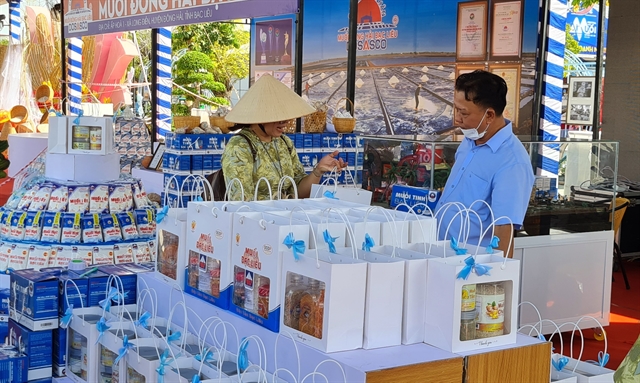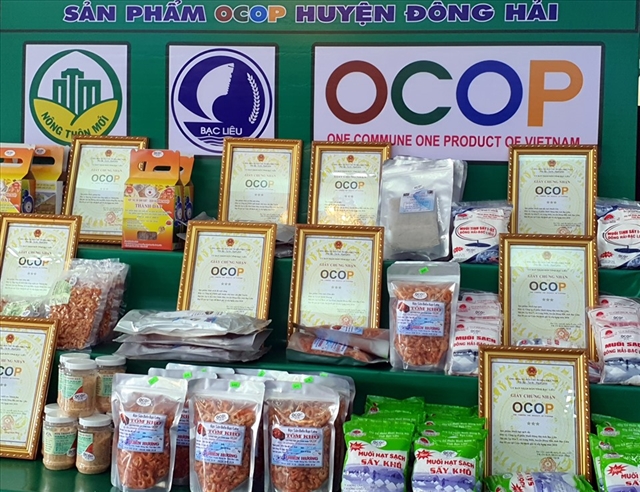The southern province of Bạc Liêu has achieved notable success in implementing the national “One Commune, One Product” programme, effectively building and asserting the brand value of its local specialities.

BẠC LIÊU — The southern province of Bạc Liêu has achieved notable success in implementing the national “One Commune, One Product” programme, effectively building and asserting the brand value of its local specialities.
The province is actively linking these products with e-commerce platforms and supermarkets to broaden market access and drive rural economic development.
According to Lưu Hoàng Ly, director of the Bạc Liêu Department of Agriculture and Rural Development, the province People’s Committee has instructed relevant departments and localities to intensify efforts to promote and introduce OCOP goods, aiming to enhance trade and consumer outreach.
A central strategy has involved cooperation agreements with other provinces and cities, including those in the Mekong Delta, HCM City, Hà Nội, the southeastern region, the Central Highlands, and Ninh Bình Province.
These focus on sharing market insights and promoting inter-provincial trade and consumption of agricultural products.
Bạc Liêu has 160 certified OCOP products, with 32 rated four-star and 128 rated three-star.
The province has also submitted two proposals to the Ministry of Agriculture and Rural Development, seeking five-star recognition for muối tinh Bạc Liêu (refined salt) and muối hạt Bạc Liêu (coarse salt).
Seven OCOP items have entered national supermarket chains, while nine have been exported internationally.
At GO! supermarkets, some producers have secured space to showcase and sell 20 certified goods.
Thanks to the region’s diverse natural conditions, featuring saline, brackish and freshwater zones, Bạc Liêu’s OCOP offerings are particularly rich and varied.
Trade promotion and market connection initiatives have been actively pursued, leading to improved sales and inroads into both domestic and overseas markets.
Participation in the programme has also driven producers to enhance quality control systems, improve packaging and labelling, register intellectual property rights, and develop marketing websites.
Of the province’s 65 OCOP owners, 20 have trademarks for their products.
Tạ Tuyết Thu, owner of Nông Sản Việt in Phước Long District, said her first OCOP-certified product, bánh phồng tôm (shrimp crackers), received a four-star rating.
Following this, she invested in machinery and adopted Hazard Analysis and Critical Control Point (HACCP) standard production.

Her range has since expanded to include muối tôm (shrimp salt), bánh phồng rau củ quả (shrimp and vegetable crackers) and bánh gạo mè đen (black sesame rice cakes).
In all, she now markets 15 OCOP products — 13 rated four-star and two rated three.
Võ Thị Hồng Thoại, owner of Thiên Phú fish sauce in Đông Hải District, said three-star OCOP recognition significantly boosted her company’s sales and visibility.
The Chairman of the Bạc Liêu People’s Committee, Phạm Văn Thiều, emphasised that OCOP is a vital initiative for rural economic development, enhancing local resources and increasing product value.
It forms an essential part of the national new-style rural development programme for 2021–2025.
“The programme has been widely and effectively rolled out, becoming a key driver of rural transformation. It supports agricultural restructuring, adds value, and improves income for residents.”
He added that the initiative encourages linkages among small businesses, cooperatives, and household producers, helping build value chains from production through processing to distribution.
The programme also promotes innovation, high-quality production and compliance with national standards for packaging and branding, helping local products gain consumer trust and expand into supermarkets and international markets.
Despite these gains, OCOP implementation in Bạc Liêu still faces obstacles.
Many goods are produced in small volumes and cannot meet large orders.
While the number of certified items continues to grow, most remain at the three-star level, and a large proportion consists of processed seafood.
To further the programme and boost sales, Thiều urged greater communication of OCOP’s goals and advantages and called for support for dedicated distribution channels.
He also called for identifying promising local goods, promoting youth-led start-ups in agriculture and rural industries, and offering targeted support for developing OCOP products in remote and disadvantaged communes to ensure broader access and benefits.
As Bạc Liêu advances its OCOP strategy, building complete value chains and embracing digital transformation will be vital to helping local products succeed in an increasingly competitive and globalised market. — VNS





